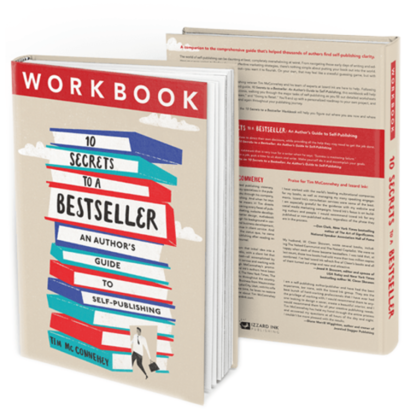START YOUR PUBLISHING JOURNEY
WITH THIS ESSENTIAL, FREE GUIDE
HOW TO PICK A SELF-PUBLISHING COMPANY
Worried about committing to a publisher? Have you heard horror stories, or experienced some yourself? After hearing from dozens of authors about their bad experiences with certain publishers, we decided to do some first-hand research.


Learning the Difference
On the surface, it can be tough to differentiate a legitimate hybrid publisher from a vanity press.
Both offer to help self-publishing authors by turning a rough manuscript into a finished product; but while a reliable publisher will offer expert feedback, a personalized plan, and experienced professionals to help publish the best book possible, the vanity press won’t spend time on quality, rushing authors to accept a one-size-fits-all plan that’s light on the details.
Warning: Vanity Presses
If it appears that we don’t like vanity presses, that would be correct. Their business model relies not on quality books, or loyal clients, but on volume—simply publishing as many authors as possible, whether or not their books stand a chance of success.
As you can imagine, they don’t get many return clients. But if they can win over enough first-time authors, who are often frustrated with rejections from traditional publishers or the intricacies of self-publishing, they have themselves a lucrative enterprise.

Ready to Start
Your Own Journey?

Helping the Self-Publishing Community
Not only is it up to individual authors to protect themselves, but the self-publishing community as a whole can benefit from raising awareness and steering authors away from misleading vanity presses.
In that spirit, Izzard is offering five ways for authors to spot the right self-publishing company and avoid vanity presses, based on our own first-hand investigation.
Five Ways to Spot the Right Self-Publishing Company

1
A Plan That Aligns With Your Goals
Any publishing plan should be built from the ground up, around the specifics of an author’s book and what they want to accomplish with it. For example, the same vanity press mentioned above failed to offer any details on what kind of editing a book will receive, or on who their editors are. This key aspect of publishing is never one-size-fits-all. An author’s needs, their book’s genre, and their goals will determine what kind of editing is needed.
Copy editing and proofreading are just the basics. Line editing provides a line-by-line edit to the language of a book. Content editing works on broader elements to make sure that a story holds together, or a non-fiction book offers clarity. A developmental editor supports a writer during the writing process, with a focus on the structure of a book. Fact-checkers verify each claim in a non-fiction book, particularly important for authors aiming to establish themselves as experts in a field. If a publisher offers “editing” without any details, they’re most likely spending as little as possible and preying on authors that don’t know the difference.
Likewise, if a publisher won’t be specific about who exactly will be working on your book, it’s not a good sign. We spoke to one vanity press that would only say they’d select an editor. They didn’t say how they’d choose, they didn’t specify what type of editing, and they didn’t offer credentials to show authors they can trust the editor. The right self-publishing company will at least name an editor and explain why they’re qualified to work on your book, or better yet, let you choose one yourself based on their experience and expertise.
The principle is the same for every aspect of the publishing process. The right choices on design, printing, marketing, and distribution will all hinge on details like your target audience, genre, and goals for your book. Don’t accept a publishing plan if it doesn’t take your goals and unique situation into account.


2
Collaborative Publishing
When choosing an editor, you should have the chance to see a trial edit. It’s absolutely essential that you work well with an editor, and share a vision for your book’s overall direction; and they should be allowed to give honest, if difficult, feedback. When choosing a designer, you should look at their portfolio to see if their style is right for your book, and if they have experience with your genre. A collaborative publisher will help select candidates that are appropriate for your genre and goals, but will let you have the final say in building a team.
It’s also worth noting that many publishers will call themselves "collaborative" publishers without really walking the walk. Make sure they offer specifics on how they’ll help achieve your goals, find team members that are right for you, and focus on editing and content above all else—without quality content, the best promotional strategies in the world won’t get you far.


3
Quantifiable Processes
Make sure you understand what you’re paying for and how to know if it’s worthwhile.
What is the structure of the publishing process?
How does a publisher get the best people working on your book?
There are two elements here.
- First, make sure they’re offering what you need, as we discussed earlier. But it’s equally crucial to make sure they’re not selling you extraneous bells and whistles that won’t pay off.
- Will marketing strategies work without a plan to draw traffic in the first place? Do you really need a movie trailer for your book?
- A press release won’t have much effect if there’s no way to make sure it reaches your target audience.
- Particularly when it comes to marketing, make sure you’re paying for plans that have a realistic path to boost sales, and a way to track whether they’re doing so.
- Don’t be fooled by smoke and mirrors, and don’t overlook the nuts and bolts in favor of flashy extras. If a publishing plan offers a video trailer, but no details on editing and cover design, or hundreds of bookmarks but no help to get book signings—look elsewhere.


4
Tells the Truth
Sometimes, it’s hard to hear criticism on a project that’s close to your heart. In one of our books, a seasoned editor found serious flaws. It was a personal project in which the author was emotionally invested with over nine years writing, and the criticism didn’t sit well with them at first. After a year, the author came back to us and acknowledged that the book sorely needed those improvements. It would have been much more effort to publish the book with its problems and be forced to clean up the mess later on.
Likewise, watch out for unrealistic promises. One vanity press which called themselves a “collaborative publisher” guaranteed that every author would be an Amazon “bestseller.” This is misleading. In the right niche with the right timing, authors can be labeled an Amazon bestseller in their highly specific category, and only sell three or four books. Others told us a successful book could be published in 90 days no matter what. Publishing is tough, and real success depends on a mixture of hard work, smart choices, and luck. As PGA Hall of Famer Annika Sörenstam says, “There are no short cuts to success.” Don’t be misled.


5
Accountability
One large vanity press told us to ignore negative reviews, saying they’re unreliable since anyone can post reviews online, even their competitors. And yet, when we asked to speak directly to past clients, they pointed us to the same reviews they had just discredited moments earlier. They may also tell you they’ve published 250,000 books from 200,000 authors—revealing how few authors publish more than one book with them.
If a publisher believes in their own process they should be happy to connect you to authors that have worked with them in the past. Talk to these authors, find out whether a publisher offered continued support, or published a book and let the chips fall where they may. If a book is struggling, do they try to market to different audiences, help with book signings, and try a new approach?


Past Performance is an Indicator of Future Performance
Talking to authors who have worked with the publisher you are considering can offer additional insights beyond an honest review of the publisher.
They’ll also offer valuable tips, pitfalls to avoid, and valuable lessons they wish they had known ahead of time. There’s a lot to gain here, and a good publisher should be happy to help.
Check out our Izzard in Action
examples from successful authors

Finding the Right Publisher is Worth Your While
It’s important to know the difference between good publishers and bad publishers. Self-publishing without any help leaves authors with little chance to stand out from millions of others. Working with the wrong company will get you nowhere, and often at great expense.
But the right self-publishing company can help produce a top-tier book that will compete on the same level as books from traditional publishers. It’s worth it to learn the difference.
How We Work

Plan
We assist you with this crucial first step by doing a manuscript assessment. We then strategize together to come up with a plan to align with your goals and vision.

Pick
We carefully curate 2 to 3 publishing professionals for you to choose from, for each step of the process—all experts with years of experience and proven results.

Publish
We will be working on your behalf in the background, navigating all the other details to make sure your project is ready to be published.

Yes, it’s Personal
You will have a dedicated book publishing consultant who is here to guide you and answer all of your questions, every step of the way.
Fluent in Any Genre

Non-Fiction Books
Establish yourself as an expert with a polished, professional approach, ensuring your points are clear, your facts are correct, and the final product is a pleasure to read.

Fiction Books
Bring your story to life, with support from handpicked and experienced experts who understand your particular genre and audience.

Coffee Table Books
Publish a beautiful, polished book that will brighten spaces and spark conversation, drawing on top design talent and premium printing options.

Memoir Books
Turn your life experiences into a story that flows succinctly and draws readers in—more than a set of experiences, this is your story, for readers to connect to and enjoy!

Young Adult Books
We’ll help craft your message with the age of your readers in mind, while telling a story that parents, librarians, and young readers will love.

Children’s Books
Our seasoned editors will help you tell your story the right way for your age group, our illustrators will help it come alive on the page, and our marketing team will find opportunities to reach parents, libraries, and schools.

Religious Books
Connect with readers on a spiritual level and publish a life-changing book driven by purpose.
Looking for More Free Resources?

Download Our Exclusive Workbook for Self-Publishing Authors
The Workbook will provide you with tools to:
- Define your goals. A free consultation is just the beginning.
- Refine your manuscript. Make necessary edits and remove any over-staging.
- Create a business plan for your book. This will empower you to begin the process of self-publishing.


Gain the Izzard Ink Edge
Wherever you are in your journey, we are here to help and guide you along toward publishing success.
À la carte services may be available under strict circumstances, please inquire for more information.
Start your Manuscript Assessment
Subscribe for Self-Publishing Pro Tips and Free Resources Delivered Directly to Your Inbox
(We don't send emails often, but when we do, we make sure it counts)




